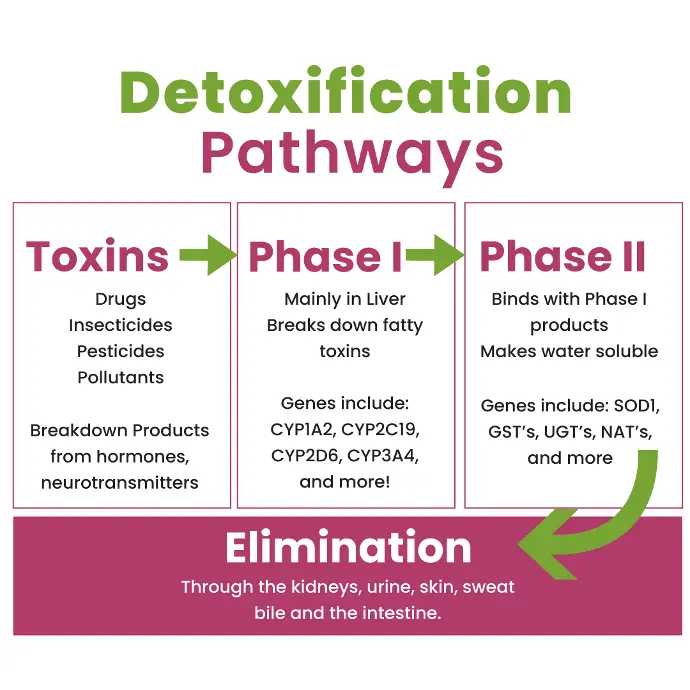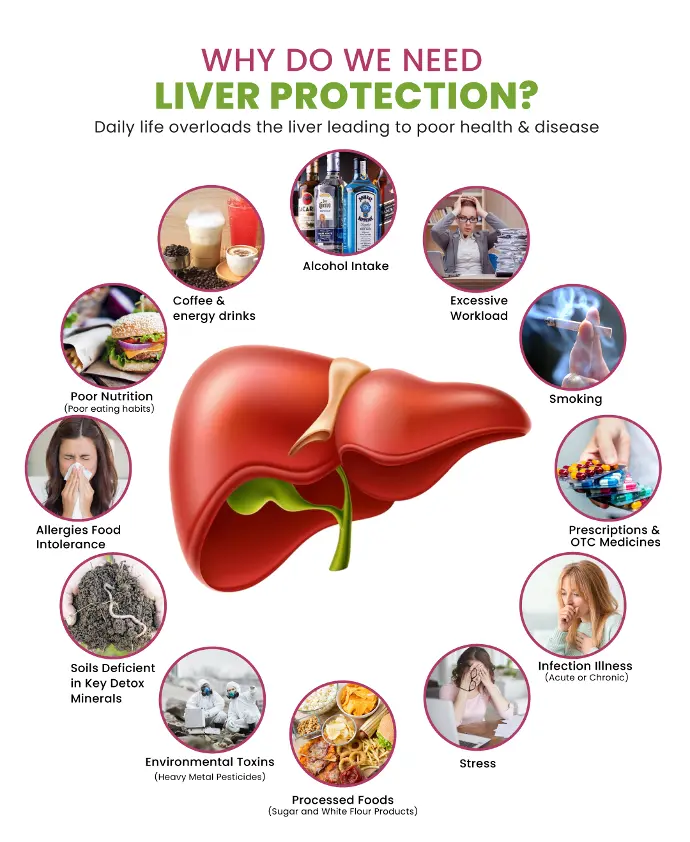Every day, your body is exposed to harmful chemicals. Your liver, kidneys, large intestine, lymphatic system, and sweat glands work together to reduce the buildup of these chemicals. This process is called detoxification, or detox. Of these organ systems, the liver plays one of the largest roles. The liver performs hundreds of functions and is needed to process nutrients and hormones, as well as remove waste products created as the result of normal body functions.
The liver also aids in breaking down and removing external toxins (naturally occurring) and toxicants (man-made):
- Farm chemicals, air pollutants, and chemicals from personal care products
- Both prescription and over-the-counter medications
- Food additives, colorings, flavor enhancers, preservatives, and artificial sweeteners
- Alcohols
- Volatile organic compounds such as those found in fragrances and air fresheners
Functions of Liver
The liver plays a crucial role in detoxification by performing the following functions:
- Metabolism of drugs and toxins: The liver processes and metabolizes various drugs, alcohol, and toxins to make them less harmful to the body.
- Bile production: The liver produces bile, which helps in the breakdown and absorption of fats and fat-soluble vitamins. Bile also aids in the elimination of waste and toxins from the body.
- Detoxification of ammonia: The liver converts ammonia, a byproduct of protein metabolism, into urea, which is then excreted in the urine. This process helps in removing harmful ammonia from the body.
- Antioxidant defense: The liver produces antioxidants such as glutathione, which help neutralize harmful free radicals and protect cells from damage.
- Storage of vitamins and minerals: The liver stores essential vitamins and minerals, such as vitamin A, vitamin D, vitamin B12, and iron, which are important for various metabolic processes and detoxification pathways.
Overall, the liver plays a vital role in detoxifying the body by processing and eliminating harmful substances, maintaining a healthy balance of nutrients, and protecting cells from damage.
Phases of Detoxification in the Liver
Phase I Liver detoxification is the first line of defense against toxins/toxicants. Phase I functions as a result of a group of enzymes known as the Cytochrome P450 family. These enzymes help neutralize substances such as caffeine and alcohol, and also help convert chemicals into forms that can be more easily removed from the body. If these toxic intermediates are allowed to build up, however, they can damage DNA and proteins. Phase II Liver detoxification’s role is to help neutralize these intermediates and transform them to compounds that can be removed by the body through a process known as conjugation.
Supporting the Work of the Liver
In Functional Medicine, diet is used to support the work of the liver in its detox processes. Various nutrients are required to fuel detox pathways. A shortage or deficiency of any one of them could mean an increased body burden, or buildupof chemicals. Additionally, specific foods can support metabolic processes of changing toxic chemicals and waste products to less harmful forms and assist in their elimination. Therefore, the dietary plans to support detox generally focus on adding in natural and whole foods to support, regulate, start, or stop various processes related to Phase I and Phase II detoxification in the liver. For individuals with genetic variability in the Cytochrome P450 system, enzyme activity maybe impaired or reduced. In these cases, detox food plans that improve Phase I metabolism and Phase II conjugation are Recommended.
How can you protect your liver?
Protecting the liver from toxic exposure is important for overall health. Here are some ways to help protect the liver:
- Limit exposure to toxins: Avoiding exposure to harmful substances such as alcohol, tobacco, pesticides, and other chemicals can help reduce the burden on the liver.
- Eat a healthy diet: Consuming a diet rich in fruits, vegetables, whole grains, and lean proteins can support liver health. Foods like garlic, turmeric, green tea, and cruciferous vegetables are known to have liver-protective properties.
- Stay hydrated: Drinking plenty of water helps the liver flush out toxins from the body.
- Exercise regularly: Regular physical activity can help improve liver function and overall health.
- Limit alcohol consumption: Excessive alcohol consumption can damage the liver over time, so it's important to drink in moderation or avoid alcohol altogether.
- Avoid unnecessary medications: Some medications can be hard on the liver, so it's important to only take medications as prescribed by a healthcare provider.
- Get vaccinated: Vaccinations for hepatitis A and B can help prevent liver infections that can lead to liver damage.
- Maintain a healthy weight: Being overweight or obese can increase the risk of fatty liver disease, so maintaining a healthy weight through diet and exercise is important for liver health.
By following these tips, you can help protect your liver from toxic exposure and support overall liver health.

